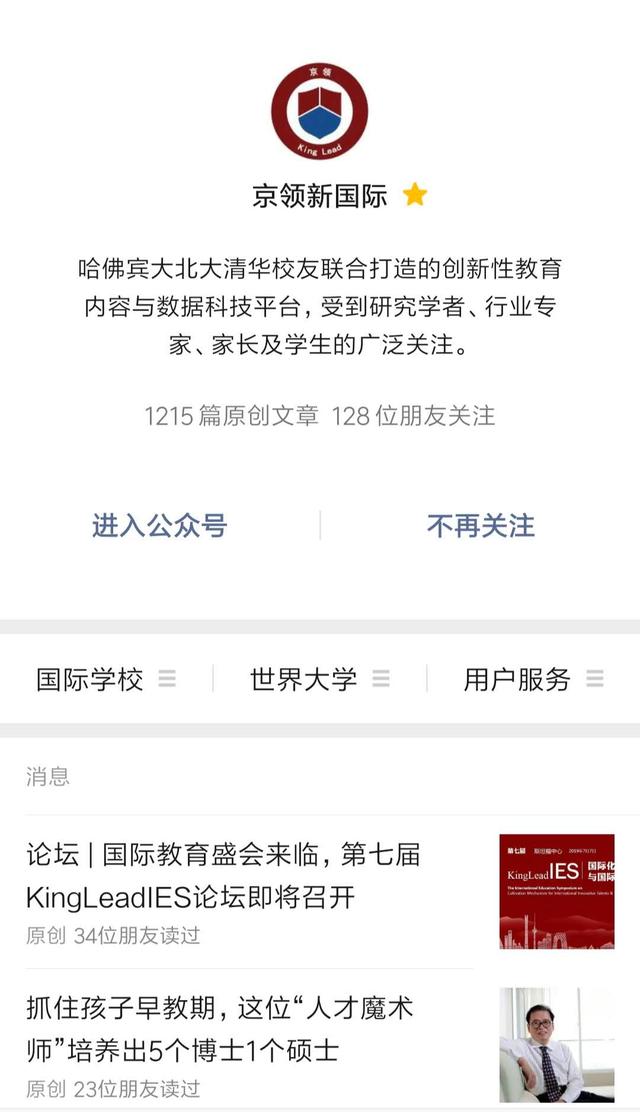大学生发展与创新教育研究中心(奇点大学影响力拓展理事)
2019年11月13日-16日, “当下的未来教育” (The Future of Education Now) 全球国际学校大会在北京京西学校成功举办。
京领新国际作为此次大会战略媒体合作方,在会后专访了大会主旨演讲嘉宾Brett Schilke。
Keynote Speaker
Brett Schilke
硅谷奇点大学影响力拓展理事
著名演讲者和教育家
奇点大学(Singularity University)
是由Google与NASA联合开办的未来学校,
每年录取率仅为2%
Brett Schilke是硅谷奇点大学影响力拓展理事,是著名的演讲者和教育家,他将自己对科技、社会以及未来的探索,通过主题演讲和互动工作坊等方式激励了全球数千人。
在本次大会中,Brett Schilke作为主题演讲嘉宾,分享了自己对于学校及社会在未来发展方向上的看法。
Q1京领新国际:您如何看待教育未来的发展?
Mr. Schilke:我认为,当我们思考教育的未来时,往往会把注意力搞错方向。我的观点是,我们现在面临的问题在于一直试图保留原有的陈旧模式,当然我不是指教育模式,而是指我们期望人们如何度过一生的方式。
在工业革命和技术革命中,人们被告知的是要上学、找工作、进职场、挣钱以及买个大房子,然后一个人就这样一直生活到生命的尽头,而这就是你为什么要上学的原因。
但即使我们知道现在的社会完全变了,人们也依旧会盲从且自以为是的认为在学校或学习过程中,只要把正确的知识和技能灌输到大脑中,就能实现所谓的成功。我们不能再自欺欺人了,未来的改变与技能之间的关联越来越少,真正和未来相关的更多是如何重塑自我这一艰巨的课题。
Q2京领新国际: 我们如何才能重塑自我呢?
Mr. Schilke:首先,有很多简单可行的方式可以帮助我们重塑自我。其中一些就像我们改变日常的对话用语一样简单。
例如,我们经常都会问别人,“你想做什么工作?”但是其实很多人在从学校毕业后却发现他一直在规划的工作可能与其所学、所想有很大差异,那我们为什么还要问这个问题?
我一直认为我们应该这样问学生“你能为这个世界做些什么?”因为你想实现的事情可能是在不断的变化的,而你也可以用上百种不同的方法来实现这个目标,但是在这个过程中目标应该是明确的。这就是我们在不断改变人们看待自己的一种方式。
图源:觅知网,已获授权
第二个做法是预测——我们可以展望未来,预测可能发生的事情。我们预测的越准确,就越能了解未来对自己意味着什么。
第三个做法是利用技术充分优化我们的学习方式。我们倾向于把课堂上的技术看作是传递信息的一种方式,这其实有些愚蠢——我看手机就能找到的信息,为什么需要你告诉我呢?
因此,我们应该把学校看作是大脑的实验室。诸如我们如何将数据、人工智能、神经学、生物学、心理学等等这些知识来进行优化,从而使大脑最大化的加以利用。学校应该教授的是如何适应和使用这些知识的方法,这样才能让我们在一生中学以致用。
Q3京领新国际:你认为在学校培养学生的创新能力重要吗?我们如何实现这一目标?
Mr. Schilke:我认为创新很重要。创新的能力未必是教出来的,我认为人类天生就很有创造力,学校是激发学生创造能力的场所。
回想一下自己在学校的经历:你被告知某个答案是正确的,某个答案错误的,你要遵守学校规则否则会被惩罚。但这与创造力的培养背道而驰,孩子的天性本身就会违反所谓的准则,而学校需要打破常规,改变这种只存在“正确答案和错误答案”的传统教育模式与环境。
我在印度做的一个项目,研究的目的在于了解规划和设计自己的未来对孩子的意义和重要性,以及如何让他们实现自己的预期目标。作为研究的一部分,我们做的一件事是把一群孩子放在一个完全空置的房间里-墙和地板都是白的,然后让孩子们做他们觉得任何有趣的事情,这是唯一的要求。
在没有任何指导的情况下,他们在大约两个小时内创建了自己的理想社区,他们的成果非常地令人难以置信。所以我认为我们唯一要做的就是给予孩子们一个安全环境,然后解放他们的天性。
图源:觅知网,已获授权
三年前,我们在广州,为6到13岁的孩子们开办了一个创新训练营。我们用了三天时间和他们交流互动,帮他们一起规划和畅想未来,从而让他们以此为基础构建出一些与众不同的且具有意义的想法和方式来达成目标。他们做得非常出色。
让我觉得最有趣的地方是,在这个项目的最后,这些孩子所展示的他们对未来的想法,以及他们想创造什么。
班上一个11岁的女孩分享了她的想法。她父亲当时也在场,他站起来对我说:“你为什么要教我的女儿这些没用的东西呢?这些对她的未来一点用处都没有。”
然而,这个女孩提出的想法实际上与一家在加利福尼亚市值10亿美元的公司中已经沿用至今。所以我回答说:“对不起,难道你不愿意让你女儿也经营一家价值10亿美元的公司吗?”
当然,他感到尴尬和沮丧,后来就一直在座位上安静地坐着。但类似这样的对话几乎在我工作过的每个国家都发生过。
图源:觅知网,已获授权
我认为从这里我们学到了,孩子本身不是问题所在,相反,是作为父母和教师我们才是重新设计未来学习模式的最大阻碍之一。
父母都希望给孩子最好的东西,但他们认为的“最好”是基于他们本身亲身经历过的时代和这个时代对人们的要求。但如今的情形却和父母当时的情况截然不同。
仅仅是认知和知识上的代沟就足以让家长们很担心现在学校会做出任何的改变。但如果我们帮助他们更好地了解未来可能出现的情况,我认为他们都会给予更多的理解和支持。这其实是关于学生,家长和老师如何能够对未来的愿景达成共识,这种共识能够最大限度的支持帮助孩子们在学校里尝试不同的挑战。
Q4京领新国际: 在你看来,中国学生和其他国家的学生有什么不同吗?
Mr. Schilke:当然,由于学校的运作方式、课程设置以及培养方式的差异与区别,不同国家的学生也都存在着不同和各自的特点。但是我在大约30个国家的学校中和学生工作过,每个地方都有同样的挑战——只是展现方式不同。通常,这些挑战涉及政策、资金和家长/教师支持,这些事情正如同一枚硬币一样,极具两面性。
Q5京领新国际:你如何看待国际学校国际课程的未来?
Mr. Schilke:我认为在未来的10到15年里,教学方法会有很大的变化。我曾讲过很多关于如何将学校作为重塑自我的地方的话题,但是如果学校仅仅教授这些是不行的。我们现在正经历的阶段是关于学习如何更好的获取和过滤信息,而随着这些知识框架和技能的迅速发展,有极大的可能性实现课程的改变。
在过去三年我参与的一个项目里,我与GEMS教育集团合作建立了一门教授未来的课程。我们花了三年时间和150000个孩子一起设计一门课程,这一课程可以在高中的一个学期里完成。这门课程不是直接提供信息,而是教孩子们如何找到他们想要的信息并将其应用到生活中。我认为在未来国际学校(我希望公立学校也一样),这样的教育方式会被越来越广泛的应用。
图源:觅知网,已获授权
而且非常重要的是,学校和老师永远都是极具价值和不可替代的,我决不赞成摒弃到学校学习的想法。我不认为有任何一个人只希望从电脑或屏幕上获取知识。作为人类,我们是相互学习的。所以我认为老师的存在比以往任何时候都重要。只是他们的工作将从一个信息来源转变为一个向导。
Q6京领新国际:当你选择一个人进入奇点大学时,有没有什么特质是你真正关注的?
Mr. Schilke:奇点大学不是一所传统的大学,你来这里不是为了学习一门课程、获取一个专业或获得一个学位。我们是一个学习机构,你到这里来进行碎片式学习,你需要什么就学什么,何时需要就何时学。我们与公司,政府,非营利组织,专业人士,各种各样的人共同工作。
我认为我们寻找的最重要的特性是对了解未来的渴望以及如何改善世界的方式。很多人都想了解未来,我们真正想要的,是如何能够在通往未来的路上将世界变得更好。
采访原文
KingLead:How do you think of the future of education?
Mr. Schilke:I think that we tend to focus on the wrong things when we think about the future of education. My basic view is that the problem we are facing right now is trying to force an old model to continue existing. And I don't mean the model of education, but the model of how we expect people to go through life.
In the last two revolutions, the industrial revolution and technological revolution, what we told people was that you go to school, you get a job, you get that job on the job market, you make money and you buy a big house, and then reach the end of your life. That's why you go to school.
But we all know that is not reality anymore. Yet we still pretending in our schools that if we just push the right skills into your brain, we will succeed. We need to stop lying to ourselves. The future is coming and it has less to do with skills, and more to do with the really difficult task of reinventing ourselves.
KingLead:How could we reinvent ourselves?
Mr. Schilke:First, there are some simple practices that we can try to develop in ourselves. A lot of them are as simple as changing the words that we use.
For example, right now, we always ask a person what job they want to have, but a job you planned for your whole life might not be a thing when you graduate. So why are we asking that question?
I always say what instead we should ask a student” What do you want to enable in the world?” Because the thing you want to enable can change, you can do that a hundred different ways, but you can always have that sort of constant line to draw you through. It's just kind of reforming the way we think about ourselves.
The second practice is forecasting - the idea that we can look to the future and predict what could happen. The better we are able to do that, the better we understand what the future means for ourselves.
The third practice is all about how we can use technology to optimize the way we learn. We tend to think about technology in the classroom as a way of delivering Information, but that's kind of silly. Why would I need you to deliver me information I can find just by looking at my phone?
So instead we should think about our schools as laboratories for our brain. Such as how do we use data, artificial Intelligence, neurology, biology, psychology and all of these things to maximize the way the brain works. Schools should be about teaching us how to adapt, and then we will adapt throughout life.
KingLead:Do you think it is important to cultivate innovation ability of students in school, and how do we achieve this goal?
Mr. Schilke:I think innovation is important. And I don't necessarily believe that the ability needs to be taught. I think humans are very naturally creative and school takes that out of us.
When you think about what happens in a school -- you go to school and you are told there are right answers and wrong answers. There are rules to follow and if you don't, you'll be punished. But those are the opposite of creativity. Children naturally break rules, I think our schools need to change the environment of “right and wrong answers."
What I'm doing right now actually in a project in India is we're exploring what it means for a child to develop and design their own future. And one of the things we did as part of our research was put a group of kids in a completely blank room--the walls were blank and white, the floors were blank and white. We told the kids to do anything they want. Just make it fun, that was the only rule.
With no instructions, they basically in two hours created a society of their own. It was absolutely unbelievable to see what they did. So I think that all we really have to do is remove some of the constraints in a safe space.
I also have done some work in China three years ago, in Guangzhou. We were running an innovation boot camp for young children age about 6 to 13. And we had three days with them to help them envision the future and decide what it was they wanted to create to make really remarkable things, and they did it Incredibly well.
And what was so fascinating to me was that at the end of this project, we had these kids present their ideas about the future and what they would like to create.
An 11-year-old girl in the class stood up and she shared her idea. Her father was in the room and he said to me, “why are you filling my daughter's head with nonsense? These ideas won't do anything good for her future." However, the interesting things is that the idea the girl presented is actually a billion-dollar company in California. So I replied “I’m sorry, but don’t you want your daughter to run a billion-dollar company?”, Of course, he was embarrassed and upset, and he sat down and was very quiet. And this same kind of interactions have happened in almost every country I have worked in.
I think the lesson there is that kids are not the problem in any way; rather, it's us - parents and teachers - that are one of the biggest roadblocks to redesigning the future of learning. It's because parents want what's best for their kids. It's a good thing, but what they believe is best is based on their own experiences of what was best for them. And the reality of today is incredibly different. There's simply a gap in awareness and knowledge, and they are very naturally afraid that the schools are doing something differently. But if we help them to have a better understanding of what the future could be like, I think they would be far more supportive. It's really about how we create a shared vision of the future so that parents and teachers and kids alike can be supportive of trying something new in schools.
KingLead:In your point of view, is there any differences between the Chinese students and students from other countries?
Mr. Schilke:Of course, there are differences as schools operate differently, schools have different curriculum, and training tends to be different in different countries. However, I have worked with schools and students in about 30 countries and there are the same challenges in every place - just exhibited in different ways. Usually those challenges are about policies, funding, and parent/teacher support. Just different sides of the same coins.
KingLead:How do you think of the future of international curriculum in the international schools?
Mr. Schilke:I think teaching methods will change a lot in the next 10 to 15 years. I speak a lot about needing to think of our schools as places to reinvent ourselves, but of course if that was all we taught today, it would not work. We are moving through a period now that is about learning how to better access and filter information, and as those interfaces and skills develop, we will be able to change curriculum along with it.
One of the most recent projects I have worked on is, for the last three years, I worked with GEMS Education to build a course that teaches the future. We spent three years working with 150,000 kids to design a course that you can teach in one semester in high school, to teach the future. And it's not about dispensing Information; it's about teaching kids how to go find the Information they want and apply it to their life. I think this is the type of learning we'll get more of in international schools (and public schools, I hope!) in the future.
And very importantly, the school and teacher will always be valuable, I am not in any way a proponent of the idea of doing away with schools. I don't think there's a single human on this planet that wants to learn from computers or screens only. As human beings we learn from each other. So I think teachers are more important than they've ever been. It's just their job that will change from a source of information to a source of guidance.
KingLead:When you choose a person to get into Singularity University, is there any trait that you really pay much attention to?
Mr. Schilke:Singularity University is not a traditional university, you do not come for a course of study or a major or a degree. We are a learning institution that you come to for small pieces of learning, what you need when you need it. We work with corporations, governments, non-profits, professionals, all sorts of people.
I think the most important trait we look for is the desire to understand how the future can help you do things better. A lot of people want to learn about the future. What we really look for is that you want to make the world better in the process.
更多独家内容请关注:
,
免责声明:本文仅代表文章作者的个人观点,与本站无关。其原创性、真实性以及文中陈述文字和内容未经本站证实,对本文以及其中全部或者部分内容文字的真实性、完整性和原创性本站不作任何保证或承诺,请读者仅作参考,并自行核实相关内容。文章投诉邮箱:anhduc.ph@yahoo.com












